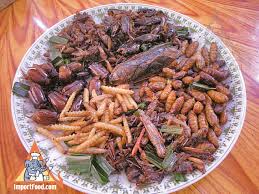The consumption of insects or eat bugs, is a common practice in some parts of the world (Africa, Asia, Latin America), where it may become part of the traditional food culture.
 To meet the challenge of feeding the world in 2030, the United Nations Food and Agriculture Organization (FAO) has ruled in favor of the development of large-scale breeding insects. In anticipation of a possible development of these products in Europe or France, ANSES has made an inventory of scientific knowledge on the risks associated with the consumption of insects. In its opinion published today, it makes an inventory of potential dangers carried by insects and research needs on this issue. Following this work, it recommends in particular to establish at Community level lists of species that can be consumed and to define a specific framework for breeding and production conditions of insects and their products, to ensure the control of health risks. Moreover, many insects and arthropods (mites, crustaceans, molluscs, etc.) With common allergens, ANSES recommends caution consumers with a predisposition to allergies.
To meet the challenge of feeding the world in 2030, the United Nations Food and Agriculture Organization (FAO) has ruled in favor of the development of large-scale breeding insects. In anticipation of a possible development of these products in Europe or France, ANSES has made an inventory of scientific knowledge on the risks associated with the consumption of insects. In its opinion published today, it makes an inventory of potential dangers carried by insects and research needs on this issue. Following this work, it recommends in particular to establish at Community level lists of species that can be consumed and to define a specific framework for breeding and production conditions of insects and their products, to ensure the control of health risks. Moreover, many insects and arthropods (mites, crustaceans, molluscs, etc.) With common allergens, ANSES recommends caution consumers with a predisposition to allergies.
The consumption of insects or eat bugs, is a common practice in some parts of the world (Africa, Asia, Latin America), where it may become part of the traditional food culture. FAO estimates that “insects complement the diets of about two billion people” in the world and in favor of the development of the breeding of insects on a large scale to meet the growing concerns over food security and protein supply.
In Europe, this practice seems to benefit from a growing interest and a number of industrial projects and research programs accompany this emerging sector, despite regulations (currently changing), which raises many questions.
In this context, ANSES has conducted an inventory of scientific knowledge on the subject, in particular regarding the potential health risks associated with consumption of insects and insect products, both food and feed.
Like all foods, insects can carry certain risks that must be controlled by the setting of specific standards to reduce the potential risks associated with the consumption of these products.
These hazards are mainly related:
to chemicals (poisons, anti-nutrients, veterinary drugs used in farming insects, pesticides or organic pollutants in the environment or insect feeding, etc.).
physical agents (hard parts of the insect sting like the rostrum, etc.).
to common allergens to all arthropods (mites, crustaceans, molluscs, etc.).
to parasites, viruses, bacteria and their toxins or fungi.
to breeding and production conditions for which should be defined specific supervision to ensure the control of health risks.
Moreover, in general, like other foods of animal or plant origin, edible insects may become, following an unsuitable preservation, unfit for human consumption.
The expert work of the Agency stresses the need for further research to conduct a full assessment of the health risks associated with consumption of insects. Furthermore, the development of such production chains insects from breeding to slaughter, should lead to the question of animal welfare, it has so far been little explored in most invertebrates.
The recommendations of the handles
In this context of uncertainty and lack of data, the Agency recommends:
accentuate the research effort on the sources of potential hazards;
to establish, at Community level, the positive and negative lists of different species and insect life stages may or may not be eaten;
to explore the issue of animal welfare for these categories of invertebrates;
to define a specific framework of the breeding and production of insects and their products to ensure the control of health risks;
setting allergic risk prevention measures, both for consumers and in the workplace.
Pending the establishment of specific standards and appropriate supervision, ANSES recommends caution consumers with a predisposition to allergies. Indeed, many insects and arthropods (mites, crustaceans, molluscs, etc.) Have common allergens.
Beyond the issues of expertise specifically associated with health risk assessment issues and nutritional benefits relating to the consumption of insects, ANSES emphasizes the strong knowledge of issues relating to the social acceptability of these new drinks or on issues of development and environmental impact associated with it.
